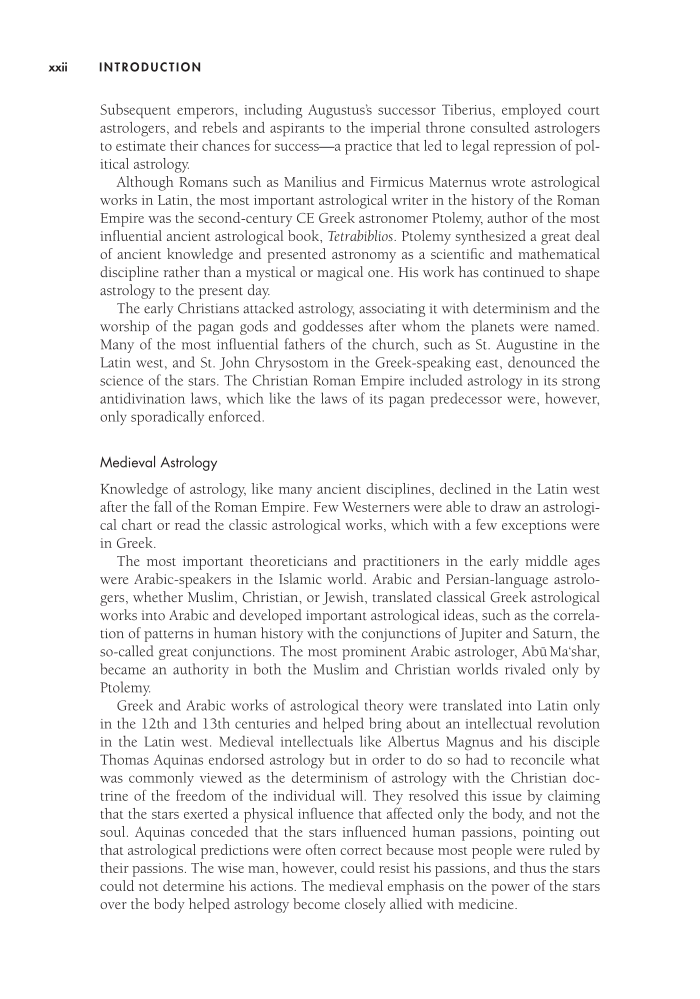xxii Introduction Subsequent emperors, including Augustus’s successor Tiberius, employed court astrologers, and rebels and aspirants to the imperial throne consulted astrologers to estimate their chances for success—a practice that led to legal repression of pol- itical astrology. Although Romans such as Manilius and Firmicus Maternus wrote astrological works in Latin, the most important astrological writer in the history of the Roman Empire was the second-century CE Greek astronomer Ptolemy, author of the most influential ancient astrological book, Tetrabiblios. Ptolemy synthesized a great deal of ancient knowledge and presented astronomy as a scientific and mathematical discipline rather than a mystical or magical one. His work has continued to shape astrology to the present day. The early Christians attacked astrology, associating it with determinism and the worship of the pagan gods and goddesses after whom the planets were named. Many of the most influential fathers of the church, such as St. Augustine in the Latin west, and St. John Chrysostom in the Greek-speaking east, denounced the science of the stars. The Christian Roman Empire included astrology in its strong antidivination laws, which like the laws of its pagan predecessor were, however, only sporadically enforced. Medieval Astrology Knowledge of astrology, like many ancient disciplines, declined in the Latin west after the fall of the Roman Empire. Few Westerners were able to draw an astrologi- cal chart or read the classic astrological works, which with a few exceptions were in Greek. The most important theoreticians and practitioners in the early middle ages were Arabic-speakers in the Islamic world. Arabic and Persian-language astrolo- gers, whether Muslim, Christian, or Jewish, translated classical Greek astrological works into Arabic and developed important astrological ideas, such as the correla- tion of patterns in human history with the conjunctions of Jupiter and Saturn, the so-called great conjunctions. The most prominent Arabic astrologer, Abuˉ Ma‘shar, became an authority in both the Muslim and Christian worlds rivaled only by Ptolemy. Greek and Arabic works of astrological theory were translated into Latin only in the 12th and 13th centuries and helped bring about an intellectual revolution in the Latin west. Medieval intellectuals like Albertus Magnus and his disciple Thomas Aquinas endorsed astrology but in order to do so had to reconcile what was commonly viewed as the determinism of astrology with the Christian doc- trine of the freedom of the individual will. They resolved this issue by claiming that the stars exerted a physical influence that affected only the body, and not the soul. Aquinas conceded that the stars influenced human passions, pointing out that astrological predictions were often correct because most people were ruled by their passions. The wise man, however, could resist his passions, and thus the stars could not determine his actions. The medieval emphasis on the power of the stars over the body helped astrology become closely allied with medicine.
Document Details My Account Print multiple pages
Print
You have printed 0 times in the last 24 hours.
Your print count will reset on at .
You may print 0 more time(s) before then.
You may print a maximum of 0 pages at a time.
















































































































































































































































































































































































































































